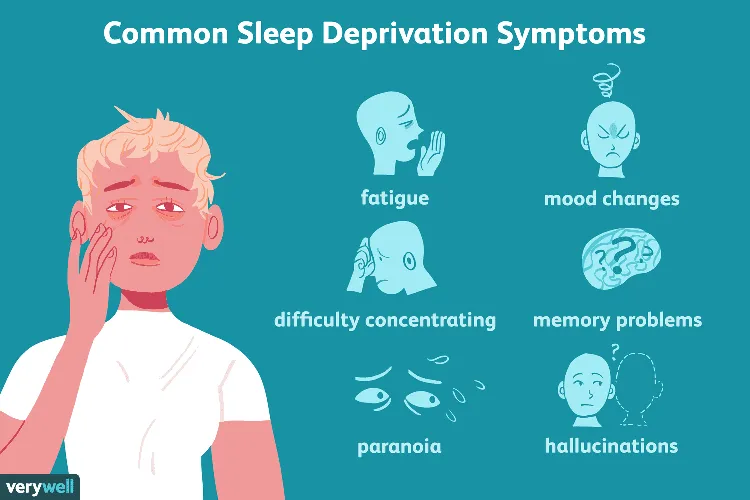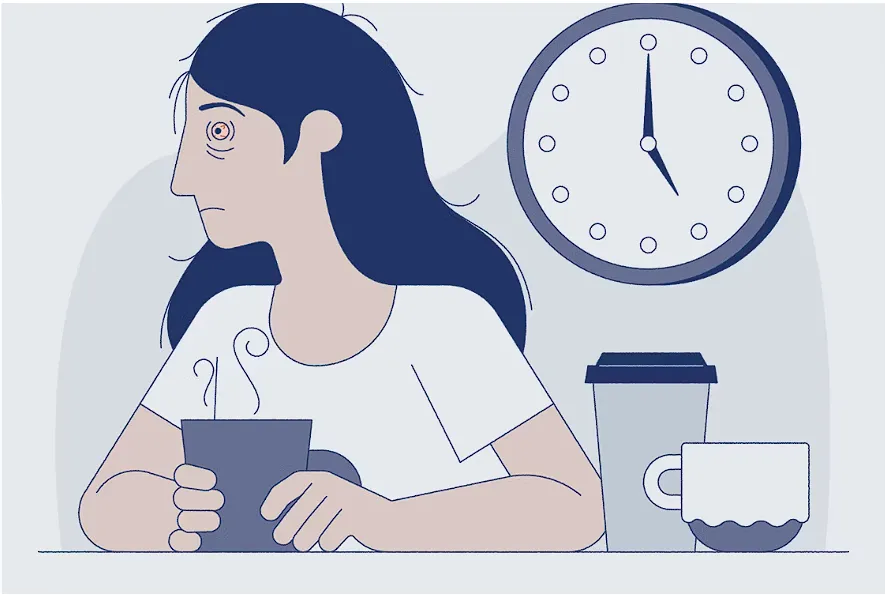By Prathamesh Kapse | 14th May, 2023
Skipping out on sleep may seem harmless, but the negative effects can accumulate over time and impact your physical and mental health. From fatigue to cognitive impairment, chronic diseases, and skin damage, improper sleep schedules can wreak havoc on your body. In this article, we'll explore the potential dangers of ignoring your sleep schedule and discuss how to establish healthier habits for a happier, more productive life.
What An Improper Sleep Schedule Gets You.
Ahh, sleep schedules. Something we all know we got to follow, but we always need to do better. It's like pressing the snooze button but not snoozing (get it?)—jet lag without going anywhere. On the outside, not having a sleep schedule can look like this.
You feel sleepy; you go through a roller coaster of emotions. You're on Mount Everest now and below the Mariana Trench later. Sometimes you get a catch-up nap, and then you feel better. But does your body feel any better? Let's review. These are the negative effects of having an improper sleep schedule. We'll also discuss how these issues occur over time, one by one, so stick around for just that.

1. Fatigue: If we don't have a proper sleep schedule, we'll lie around all day. The tendency to not feel energetic to do any work and not be productive can lead to feeling tired and getting catch-up naps, which worsens the situation further. We also have trouble concentrating on the task at hand.
2. Emotional Roller-Coasters: Having improper sleep schedules or insufficient sleep for a day can make us irritable easily, anxious, frustrated, depressed, and many other things. We feel very moody. I’m certain that everybody has experienced this at least once, only a select category of people sleeps on time and gets proper sleep every night.
3. The needle keeps advancing: Not having enough sleep can lead to issues like weight gain. This is because lack of sleep affects the body's metabolism and appetite. We may want to eat everything unhealthy, high-fat, and sugar-containing junk food. We will struggle to maintain a healthy weight.
4. Being prone to diseases: Staying up late at night can cause issues with the immune system. Our immune system is like a little army preparing for battle when we sleep. Just like soldiers need rest to be in tip-top shape for their next mission, our immune cells need rest too. During sleep, our immune cells get busy fighting off nasty invaders lurking around, like viruses, bacteria, and other germs. They also use this time to repair any damage that's been done to our cells and tissues throughout the day. So, the next time you're under the weather, remember to catch some Z's! It could be the boost your immune system needs to kick those pesky germs to the curb.
5. Cognitive impairment: You've slept less than you need. The day has already started badly, and you're just in for a ride that keeps getting worse. Bad sleep schedules cause cognitive impairment. What's that? Imagine walking into a room and completely forgetting why you went there. Imagine forgetting something you just read. Imagine forgetting where you put the keys just 5 minutes ago. It can make you feel like you're in an upside-down world. Everything is a bit off. But hey! You'll never get bored; that's my guarantee (Been there, done that). This includes issues with memory, concentration, and focus.
6. Increased risk of diseases you should have at an older age, but you have attracted them now: I'm talking about chronic diseases. Ever listened to the older people around you talking about diabetes, high blood pressure, heart disease, stroke, and obesity? Now, ideally, younger people shouldn't be facing these issues because of, well, newer bodies. But an inefficient sleep schedule can make you prone to these diseases at an early age. (Despite the newer bodies) You should never ask for sleep deprivation if you're ever hypothetically given a choice to ask for three bad habits. It's the only thing that has effects on every body part.
7. Let's talk about the thing that matters the most to us, damage to the skin: Sleep deprivation can cause issues like dark circles, dull skin, and visible wrinkles, God is this a nightmare? Perhaps it is! I used to not get proper sleep for quite a bit, resulting in dark circles and wrinkles. I still need to get rid of those dark circles! (they’re pretty bad).

Let's talk about the thing that matters the most to us, damage to the skin: Sleep deprivation can cause issues like dark circles, dull skin, and visible wrinkles, God is this a nightmare? Perhaps it is! I used to not get proper sleep for quite a bit, resulting in dark circles and wrinkles. I still need to get rid of those dark circles! (they’re pretty bad).
All of this is fine; these negative effects can be looked up anywhere on the internet. Sure, you can read them, but it's not like you don't get one day of sleep and face all these issues. Yeah, ironically enough, everything requires consistency. Even bad habits do. So, let's discuss what would happen if you had a bad sleep schedule and worship its consistency.
Day One (interstellar soundtrack reference).
You can get away with it if you don't get enough sleep for one day. Just sleep properly the next day, and you're good. You may feel fatigued, sleepy, and tired and have difficulty concentrating. But that's not on a large, dangerous scale. If you don't sleep at all, then these issues become significant. There's then a higher risk of accidents due to impaired judgment and reaction time.
Day 3.
Ongoing fatigue and difficulty concentrating. The same issues worsen. You face mood swings. That's about it. Things get a little dangerous after that. You start to crave unhealthy foods - high-fat, high-sugar-containing edibles.
One week.
Ongoing fatigue, lack of focus, difficulty concentrating, increased irritability, and frustration. Your immune system starts getting weaker, and you increase the risk of falling ill. Not only that, but you also have trouble sleeping and maintaining a sleep cycle.
One month.
After a month of poor sleep, a person may experience various physical and mental health effects, including increased stress levels, mood disorders such as depression and anxiety, and chronic fatigue. They may also have a weakened immune system, increasing their risk of illness and disease.
One year.
Things have now started to heat up immensely. You don't realize it much. But staying up late and not getting proper sleep has worsened your health in numerous ways. Nothing is cool now. You have increased your chances of acquiring chronic diseases like heart disease, diabetes, high blood pressure, obesity, and an increased risk of accidents and errors rooted in cognitive impairment.
Two years.
A poor sleep schedule over two years can also impact mental health. A person may be at increased risk of developing anxiety and depression, as well as experiencing ongoing stress and difficulty coping with daily life. Overall, the negative effects of poor sleep can compound over time, with significant impacts on a person's physical and mental health over the course of 2 years and beyond. It's important to prioritize good sleep habits and seek help if sleep problems persist.

diseases caused due to improper sleep schedules
After all, these consequences grow exponentially. It's one after the other. Weakening of the immune system is a very dangerous effect cascading into larger and deadlier consequences. A proper sleep schedule and a good night's sleep consistently are important for various reasons. In the previous article, we discussed what happens when we sleep. We discussed sleep cycles and the way they work. In the next week's article, we'll discuss what happens when we sleep apart from the sleep cycles—for example, memory storage and hormonal changes, immune system changes and improvements, etc. We will also discuss what dreams are and how they occur. How your brain pieces together all its information and creates new beings and objects out of already existing memory. Let me give you this month's motto: Find your circadian rhythm!
See you next week!
This is the second of a four article series on Sleep. Check out the first article of this collection: What Happens When We Sleep?: A Peek Inside Your Asleep Brain
Thumbnail Design by Mudit Jha






Forgot password?
Close message
Subscribe to this blog post's comments through...
Subscribe via email
SubscribeComments
Post a new comment
Comment as a Guest, or login:
Connected as (Logout)
Not displayed publicly.
Comments by IntenseDebate
Reply as a Guest, or login:
Connected as (Logout)
Not displayed publicly.